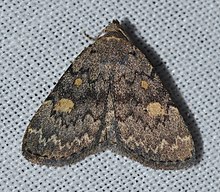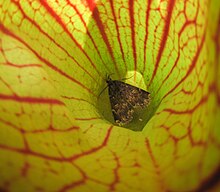Idia is a genus of litter moths of the family Erebidae first described by Jacob Hübner in 1813.[2][3][1]
| Idia | |
|---|---|

| |
| Idia aemula | |
| Scientific classification | |
| Domain: | Eukaryota |
| Kingdom: | Animalia |
| Phylum: | Arthropoda |
| Class: | Insecta |
| Order: | Lepidoptera |
| Superfamily: | Noctuoidea |
| Family: | Erebidae |
| Subfamily: | Herminiinae |
| Genus: | Idia Hübner, 1813 |
| Synonyms[1] | |
| |

Description
editPalpi sickle shaped and slender, where the second joint reaching above vertex of head. Thorax and abdomen smoothly scaled. Tibia hairless. Forewings with round apex. Hindwings with vein 5 from lower angle of cell.[4]
Species
editSpecies include the following:[1]
- Idia aemula Hübner, 1813 – common idia moth, powdered snout moth or waved tabby moth
- Idia americalis Guenée, 1854 – American idia moth or American snout moth
- Idia calvaria Denis & Schiffermüller, 1775
- Idia denticulalis (Harvey, 1875) – toothed idia moth
- Idia diminuendis Barnes & McDunnough, 1918 – orange-spotted idia moth
- Idia forbesii French, 1894 – Forbes' idia moth
- Idia gopheri J. B. Smith, 1899 – tortoise commensal noctuid moth
- Idia immaculalis (Hulst, 1886) – immaculate idia moth
- Idia julia Barnes & McDunnough, 1918 – Julia's idia moth
- Idia laurentii J. B. Smith, 1893 – Laurentine idia moth
- Idia lubricalis Geyer, 1832 – glossy black idia moth
- Idia majoralis J. B. Smith, 1895 – greater idia moth
- Idia occidentalis (Smith, 1884)
- Idia parvulalis Barnes & McDunnough, 1911
- Idia rotundalis Walker, 1866 – chocolate idia moth, rotund idia moth
- Idia scobialis Grote, 1880 – smoky idia moth
- Idia suffusalis J. B. Smith, 1899
- Idia terrebralis Barnes & McDunnough, 1912
Unpublished species
edit- Idia concisa Forbes, 1954 or Idia sp. nr. aemula – pale-winged idia moth
References
edit- ^ a b c Savela, Markku. "Idia Hübner, [1813]". Lepidoptera and some other life forms. Retrieved 3 September 2024.
- ^ Lafontaine, Donald; Schmidt, Christian (19 Mar 2010). "Annotated check list of the Noctuoidea (Insecta, Lepidoptera) of North America north of Mexico". ZooKeys. 40: 26. doi:10.3897/zookeys.40.414.
- ^ Zahiri, Reza; et al. (2011). "Molecular phylogenetics of Erebidae (Lepidoptera, Noctuoidea)". Systematic Entomology. 37: 102–124. doi:10.1111/j.1365-3113.2011.00607.x. S2CID 84249695.
- ^ Hampson, G. F. (1895). The Fauna of British India, Including Ceylon and Burma: Moths Volume III. Taylor and Francis – via Biodiversity Heritage Library.